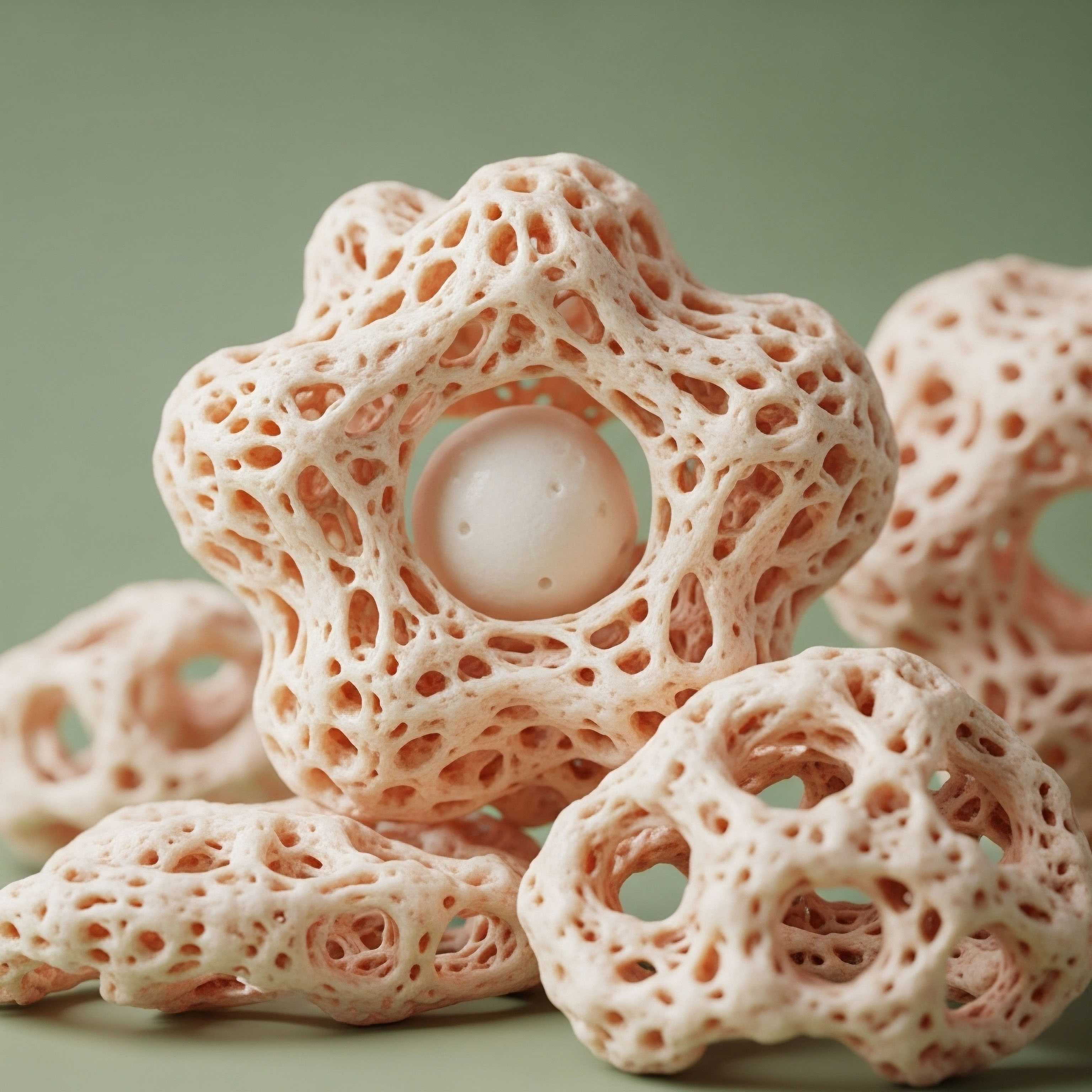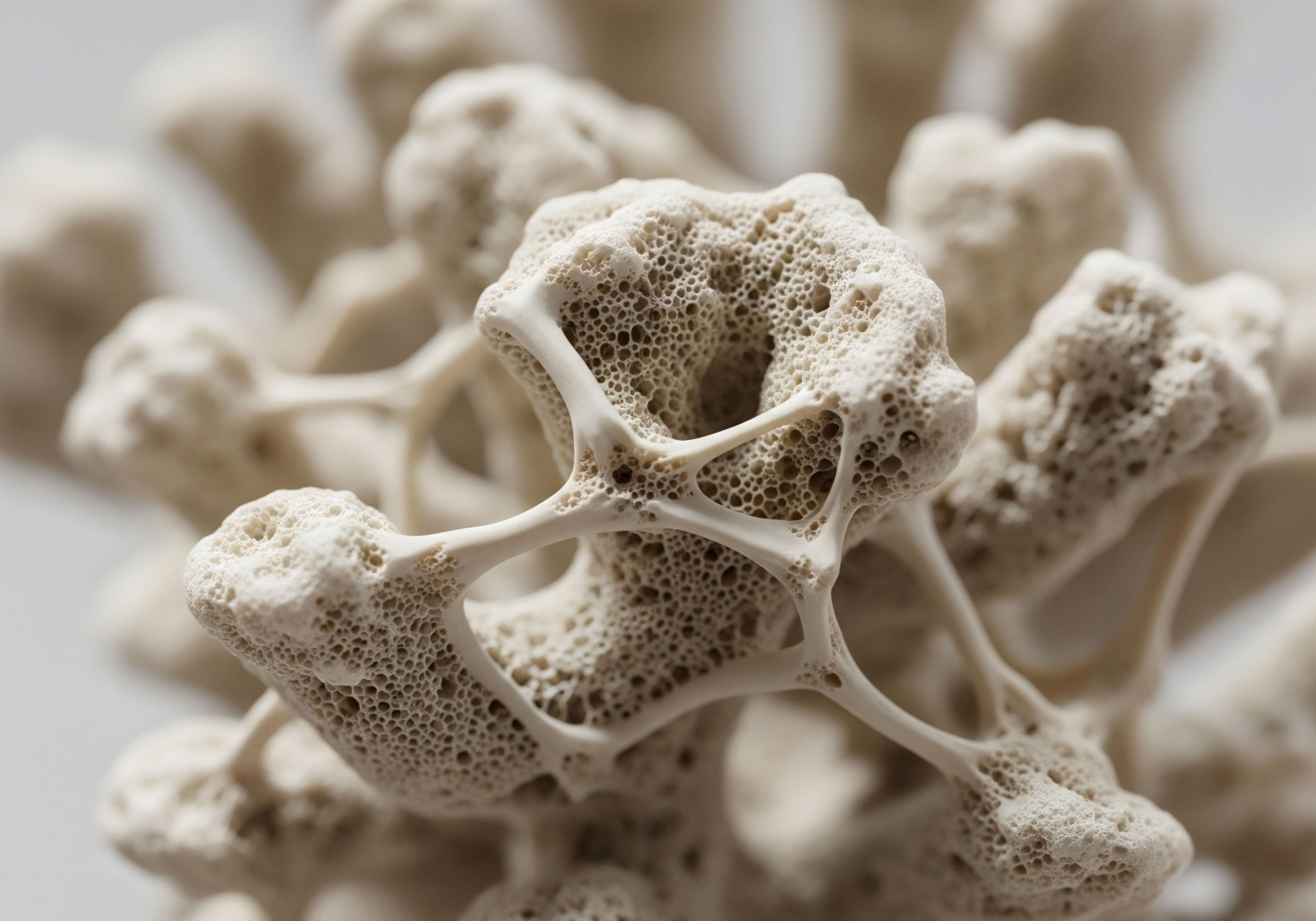

Fundamentals
Have you noticed a subtle shift in your mental clarity, perhaps a slight dimming of that sharp focus you once possessed? Many individuals experience a quiet concern about cognitive changes as the years progress, often attributing these shifts to the inevitable march of time.
This experience is deeply personal, sometimes manifesting as a fleeting memory lapse or a general sense of mental fogginess that simply wasn’t present before. Understanding these lived experiences is the starting point for exploring the intricate biological systems that govern our vitality and cognitive function. We recognize that these feelings are not merely subjective; they are often echoes of deeper physiological changes within the body.
Our biological systems operate as a sophisticated internal communication network, with hormones serving as vital messengers. Among these, testosterone plays a far more expansive role than commonly perceived, extending well beyond its recognized influence on muscle mass or reproductive health. This potent steroid hormone acts as a key orchestrator in numerous bodily processes, including those within the central nervous system. Its presence, or absence, can significantly shape how our brains function and age over time.
The body maintains a delicate balance through feedback loops, particularly within the Hypothalamic-Pituitary-Gonadal (HPG) axis. This intricate system involves the hypothalamus, which releases gonadotropin-releasing hormone (GnRH); the pituitary gland, which responds by secreting luteinizing hormone (LH) and follicle-stimulating hormone (FSH); and the gonads (testes in men, ovaries in women), which then produce testosterone and other sex hormones.
A disruption at any point in this axis can ripple through the entire system, affecting hormonal output and, consequently, various bodily functions, including brain health.
Testosterone’s influence on the brain is multifaceted. It interacts with specific receptors located throughout various brain regions, impacting neuronal health, neurotransmitter synthesis, and overall cognitive processing. A decline in optimal testosterone levels, often associated with aging, can therefore contribute to the cognitive symptoms many individuals report. Recognizing this connection allows us to consider how supporting hormonal balance might offer a pathway to maintaining mental acuity and overall well-being as we age.
Testosterone’s influence extends beyond physical attributes, acting as a crucial regulator of brain function and cognitive vitality.

Hormonal Signaling in the Brain
Brain cells, known as neurons, possess receptors for testosterone, allowing this hormone to directly influence their activity. This interaction is not limited to a single brain area; instead, it spans regions involved in memory, mood regulation, and executive function. When testosterone binds to these receptors, it can initiate a cascade of cellular events that support neuronal health and connectivity.
The presence of optimal testosterone levels supports the maintenance of neural pathways. It also contributes to the production of certain neurotransmitters, the chemical messengers that facilitate communication between brain cells. This intricate interplay underscores why hormonal fluctuations can be felt so acutely in cognitive and emotional states.


Intermediate
Addressing suboptimal hormonal levels involves carefully considered clinical protocols designed to restore physiological balance. These interventions, often termed hormonal optimization protocols, are not about exceeding natural ranges but about recalibrating the body’s internal messaging system to support optimal function. The selection of specific agents and their administration methods is tailored to individual needs, reflecting a personalized approach to wellness.

Testosterone Replacement Therapy for Men
For men experiencing symptoms of low testosterone, a common protocol involves weekly intramuscular injections of Testosterone Cypionate, typically at a concentration of 200mg/ml. This method provides a steady supply of the hormone, aiming to bring levels into a healthy physiological range. However, simply replacing testosterone can sometimes lead to a suppression of the body’s natural production and, in some cases, affect fertility.
To mitigate these concerns, additional medications are often integrated into the protocol. Gonadorelin, administered via subcutaneous injections twice weekly, helps to stimulate the pituitary gland, thereby encouraging the testes to continue their own testosterone production and maintain fertility.
Another important consideration is the conversion of testosterone into estrogen, a process that can lead to undesirable side effects if estrogen levels become too high. To manage this, an oral tablet of Anastrozole is often prescribed twice weekly, acting as an aromatase inhibitor to block this conversion. In certain situations, Enclomiphene may also be included to specifically support luteinizing hormone (LH) and follicle-stimulating hormone (FSH) levels, further preserving natural testicular function.

Testosterone Optimization for Women
Women also benefit from testosterone optimization, particularly those navigating the complexities of pre-menopausal, peri-menopausal, and post-menopausal phases. Symptoms such as irregular cycles, mood changes, hot flashes, and diminished libido often signal a need for hormonal recalibration. Protocols for women typically involve lower doses of Testosterone Cypionate, often 10 ∞ 20 units (0.1 ∞ 0.2ml) weekly via subcutaneous injection, reflecting the body’s physiological requirements.
The inclusion of Progesterone is a key component, with its prescription guided by the woman’s menopausal status and specific hormonal profile. For some, pellet therapy offers a long-acting testosterone delivery method, providing sustained release over several months. Similar to men’s protocols, Anastrozole may be used when appropriate to manage estrogen conversion, ensuring a balanced hormonal environment.

Beyond Testosterone Specifics
Hormonal health extends beyond testosterone alone. Growth hormone peptide therapy represents another avenue for supporting overall vitality and cellular repair. Peptides like Sermorelin, Ipamorelin / CJC-1295, Tesamorelin, Hexarelin, and MK-677 are utilized by active adults and athletes seeking benefits such as anti-aging effects, muscle gain, fat loss, and improved sleep quality. These agents work by stimulating the body’s natural production of growth hormone, influencing metabolic function and cellular regeneration.
Other targeted peptides address specific concerns. PT-141, for instance, is employed for its role in sexual health, acting on neural pathways to support libido and arousal. Pentadeca Arginate (PDA) is recognized for its contributions to tissue repair, accelerating healing processes, and modulating inflammatory responses throughout the body. These diverse agents collectively represent a sophisticated toolkit for personalized wellness.
| Aspect | Men’s Protocol | Women’s Protocol |
|---|---|---|
| Primary Agent | Testosterone Cypionate (IM) | Testosterone Cypionate (SubQ) |
| Typical Dosage | 200mg/ml weekly | 0.1 ∞ 0.2ml weekly |
| Estrogen Management | Anastrozole (oral) | Anastrozole (oral, if needed) |
| Fertility/Natural Production Support | Gonadorelin, Enclomiphene | Progesterone (based on status) |
| Alternative Delivery | N/A | Pellet Therapy |

Post-Optimization or Fertility Support
For men who have discontinued testosterone optimization or are actively trying to conceive, a specific protocol aims to restore natural hormonal production and fertility. This typically includes a combination of Gonadorelin, Tamoxifen, and Clomid. Gonadorelin supports the HPG axis, while Tamoxifen and Clomid, as selective estrogen receptor modulators (SERMs), help to stimulate the pituitary gland’s release of LH and FSH, thereby encouraging endogenous testosterone synthesis. Anastrozole may be an optional addition in these cases to manage any estrogenic effects.


Academic
The long-term effects of testosterone optimization on brain aging represent a compelling area of clinical investigation, moving beyond symptomatic relief to consider the foundational neurobiological mechanisms at play. The brain, a highly metabolically active organ, is particularly sensitive to hormonal fluctuations, and testosterone’s role in maintaining neuronal integrity and cognitive resilience is increasingly understood.

Neurobiological Mechanisms of Testosterone
Testosterone exerts its influence on the brain through several pathways. It can directly bind to androgen receptors (ARs) located on neurons and glial cells throughout various brain regions, including the hippocampus, prefrontal cortex, and amygdala. These regions are critical for memory formation, executive function, and emotional regulation. Activation of ARs can modulate gene expression, leading to the synthesis of proteins vital for neuronal survival, synaptic plasticity, and neurotransmitter synthesis.
A significant aspect of testosterone’s neuroprotective capacity involves its conversion to estradiol via the enzyme aromatase. Estradiol, an estrogen, also possesses potent neuroprotective properties, acting through estrogen receptors (ERs) in the brain. This dual mechanism ∞ direct androgenic action and indirect estrogenic action ∞ underscores the complex interplay of sex hormones in brain health. Research indicates that optimal levels of both testosterone and its estrogenic metabolites are necessary for maintaining cognitive function and protecting against neurodegeneration.
Testosterone also influences neurotransmitter systems. It has been shown to modulate the activity of dopaminergic, serotonergic, and cholinergic pathways, all of which are critical for mood, motivation, and cognitive processing. For instance, studies suggest a correlation between lower testosterone levels and reduced dopamine receptor density in certain brain areas, potentially contributing to symptoms of apathy or reduced drive.
Testosterone influences brain health through direct receptor binding and conversion to neuroprotective estrogens, impacting memory, mood, and executive function.

Testosterone and Brain Structure
Longitudinal studies investigating the impact of testosterone optimization on brain aging have explored changes in brain structure and volume. Some research indicates that maintaining physiological testosterone levels may be associated with preserved gray matter volume in regions susceptible to age-related atrophy, such as the hippocampus. This preservation could translate to better memory function and reduced risk of cognitive decline.
The hormone’s influence extends to cerebral blood flow. Adequate testosterone levels appear to support healthy vascular function within the brain, ensuring a consistent supply of oxygen and nutrients to neuronal tissue. Compromised cerebral blood flow is a known contributor to cognitive impairment, making this aspect of testosterone’s action particularly relevant to long-term brain health.

How Does Testosterone Optimization Affect Neuroinflammation?
Chronic low-grade inflammation is a recognized contributor to brain aging and neurodegenerative conditions. Testosterone exhibits anti-inflammatory properties, potentially modulating the activity of glial cells ∞ the brain’s immune cells ∞ and reducing the production of pro-inflammatory cytokines. By mitigating neuroinflammation, testosterone optimization may offer a protective effect against neuronal damage and support a healthier brain microenvironment over time.
The interplay between hormonal status and metabolic health is also highly relevant to brain aging. Conditions such as insulin resistance and metabolic syndrome are linked to accelerated cognitive decline. Testosterone plays a role in glucose metabolism and insulin sensitivity.
By optimizing testosterone levels, particularly in individuals with metabolic dysregulation, there is potential to indirectly support brain health by improving systemic metabolic parameters. This systems-biology perspective highlights that brain aging is not an isolated process but is deeply interconnected with overall physiological balance.
Optimizing testosterone may help preserve brain volume and improve cerebral blood flow, supporting cognitive resilience.
| Mechanism | Brain Region/System Affected | Potential Long-Term Benefit |
|---|---|---|
| Androgen Receptor Activation | Hippocampus, Prefrontal Cortex | Enhanced synaptic plasticity, neuronal survival |
| Aromatization to Estradiol | Widespread, particularly memory centers | Neuroprotection, reduced oxidative stress |
| Neurotransmitter Modulation | Dopaminergic, Serotonergic, Cholinergic pathways | Improved mood, motivation, cognitive processing |
| Cerebral Blood Flow Regulation | Global brain vasculature | Sustained nutrient and oxygen supply to neurons |
| Anti-inflammatory Action | Microglia, Astrocytes | Reduced neuroinflammation, protection against neuronal damage |

Are There Cognitive Benefits from Testosterone Optimization?
Clinical trials and observational studies have explored the cognitive outcomes of testosterone optimization. While results can vary based on baseline testosterone levels, age, and the presence of co-morbidities, some evidence suggests improvements in specific cognitive domains. These often include verbal memory, spatial ability, and executive functions such as attention and processing speed. The most pronounced benefits are typically observed in individuals with clinically low testosterone levels who receive appropriate replacement therapy.
The duration of optimization also appears to influence outcomes. Long-term adherence to a well-managed protocol may offer more sustained cognitive benefits compared to short-term interventions. This suggests that maintaining a stable, physiological hormonal environment over time is key to supporting brain health as one ages.
Long-term testosterone optimization may support cognitive functions like memory and attention, especially in individuals with low baseline levels.

References
- Moffat, Cynthia A. and Susan M. Resnick. “Effects of testosterone on cognition in older men ∞ a review of the literature.” Journal of Clinical Endocrinology & Metabolism 89.8 (2004) ∞ 3696-3702.
- Cherrier, Monique M. et al. “Testosterone replacement therapy improves cognition in older men with low testosterone levels.” Journal of the American Geriatrics Society 52.12 (2004) ∞ 2005-2010.
- Davis, Susan R. et al. “Testosterone in women ∞ the clinical significance.” The Lancet Diabetes & Endocrinology 3.12 (2015) ∞ 980-992.
- Rosario, Paula W. et al. “Effects of testosterone replacement therapy on cognitive function in men with late-onset hypogonadism ∞ a systematic review and meta-analysis.” Aging Male 21.1 (2018) ∞ 1-10.
- Beauchet, Olivier, et al. “Testosterone and cognitive function in older men ∞ a systematic review.” Journal of the American Geriatrics Society 58.6 (2010) ∞ 1168-1175.
- Yeap, Bu B. et al. “Testosterone and cognitive function in older men ∞ a review of the evidence.” Maturitas 76.3 (2013) ∞ 215-222.
- Janowsky, Jeri S. et al. “Testosterone and the aging brain.” Journal of Clinical Endocrinology & Metabolism 95.10 (2010) ∞ 4614-4623.

Reflection
Understanding the intricate connections within your own biological systems marks a significant step toward reclaiming vitality. The knowledge shared here about hormonal health and its influence on brain aging is not merely information; it is a lens through which to view your personal health journey with greater clarity. Consider how these insights resonate with your own experiences and aspirations for long-term well-being.
Your unique biological blueprint requires a personalized approach. This exploration serves as a foundation, inviting you to consider the next steps in understanding and supporting your body’s innate capacity for balance and function. The path to sustained health and cognitive resilience is a collaborative one, often requiring guidance tailored to your individual needs and goals.



